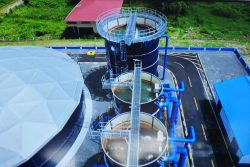Dear Editor,
Un tour d’horizon of the current socio-economic situation obtaining in Guyana would reveal a raft of issues that has pushed government, the political opposition as well as the relevant stakeholders further and further away from each other.
Since late 2015, there has been a widening gap between government and the political opposition, the business community as well between government and the poor and powerless. A similar situation has arisen between government and sections of the media.
The case of the political divide, irrespective of who is in government or opposition, has long become a characteristic feature of the political culture of Guyana.
Entrenchment in the body politic of the two dominant political forces seems irretrievable.
As 2018 draws to a close and with 2019 beckoning it will get worse. And on the cusp of 2020 they will be at each other’s throats as the nation becomes afflicted with elections fever.
The prospects for an above the fray, constructive and productive political dialogue between government, the political opposition and relevant stakeholders is receding with every passing day. We seem to have reached a point of no return.
The expectation that parliament would have been the forum to ‘jaw, jaw rather than to war, war’ evaporated a long time ago. If the situation deteriorates further good governance is likely to become a ‘fleeting illusion to be pursued, never to be attained.’
So entrenched are the dominant political forces in the body politic that whatever oxygen there is in the political atmosphere, most of it is being sucked up by them, leaving more carbon dioxide than oxygen for those who are out on the periphery.
The toxic nature of the political atmosphere is compounded by pervasive ethnic politics, the smallness of the country’s population and the preponderance of state-run narratives that seek to dominate the public psyche.
Guyana is unique when compared with other member states of CARICOM.
It is rich and abundant in natural resources. Its human resource though numerically small is relatively well educated and multi-talented.
Guyana has a work force and farming community who have accumulated years of experience from working in bauxite, gold and diamond mines, the fields and factories of the rice and sugar industries, the fishing industry on land and at sea; in the construction industry, the manufacturing, commercial and service industries, the aviation and shipping sectors as well as in sports and culture. Guyana has master boat builders, carpenters, joiners and fantastic masons, certified electricians and innovative motor mechanics not to mention its creative architects, writers and artists.
But, as in every small economy, there are external and internal challenges. When the aggregate contributions to the GDP of Guyana’s agricultural, fishery and forestry sector; its mining and quarrying sector as well as its manufacturing and services sectors are taken into consideration we would arrive at a total of approximately 90.3 per cent of GDP (2017).
In the meanwhile, the IMF has forecast that by 2023 the oil and gas sector’s contribution to GDP is likely to be somewhere in the vicinity of 27.9 per cent.
Interestingly, as of 2017, Guyana’s agricultural, fishing and forestry sector taken together with its manufacturing sector, accounted for almost as much as what the IMF has projected oil and gas will contribute to GDP by 2023.
The point that must be stressed is that notwithstanding the abundance of its natural resources, even before the emergence of the oil and gas sector and strong growth rates between 2011 and 2012 and in 2007 due to high gold prices, Guyana’s economic vulnerability remained a constant challenge due to the price taking syndrome and its dependence on an export-led growth strategy.
Moreover, notwithstanding the Herculean efforts aimed at bringing about rapid growth with human development, and the implementation of poverty reduction strategies and growth-enhancing aid programmes financed by our multilateral development partners, while they pushed Guyana into the middle income category of countries, cumulatively they were insufficient to sustain the rise in economic growth to bring about social justice and eco-justice within the framework of a people-centred development strategy.
In the circumstances, it is the susceptibility to external shocks that impacted negatively the country’s economy.
It is this persistent external factor that will continue to haunt the country’s economic fortunes and pose a major challenge, if not obstacle to people-centred growth and development, regardless of which party is in government.
Already the Economic Commission for Latin America and the Caribbean (ECLAC) has forecast a reduction in Latin America’s growth rate from 1.5 to 1.3 per cent in 2018. The English and Dutch-speaking countries will experience a growth rate of 1.9 percent in 2018 with a slight increase to 2.1 percent in 2019 due to the deterioration of the financial environment, the global trade war and increased protectionism.
Oil and gas as commodities traded on the international (futures) market can be subjected to even more damaging prospects given the vagaries of the price taking phenomenon especially when an economy becomes wholly and solely dependent on the petroleum sector.
The current economic and financial crises in Trinidad and Tobago and Venezuela are classical examples of how a country’s vulnerabilities can be exacerbated and internalized to such an extent that social, political and economic crises becomes the order of the day.
To avoid the bad experiences of those two countries, attention will have to be paid to the petroleum and gas sector which has the tendency to crowd out the agricultural sector in particular and to drive the country’s human resources towards the more lucrative and better salaried oil and gas sector to the detriment of the agricultural and manufacturing sectors.
In light of the extant hostile political climate in the country and with no end in sight vis-a-vis a political solution, there is no prospect that the challenges facing the country will be resolved through dialogue between government, the political opposition, the business community and other social actors.
Uneven and episodic growth performances, untenable macroeconomic stability, the collapse of key productive sectors, real income stagnation and intermittent strong growth performances within specific time periods have served to throttle rather than advance Guyana’s growth and development performance.
What is interesting though is that notwithstanding the differences, all stakeholders are committed to a market economy but with varying degrees of emphasis on the social sector, the macroeconomic framework, taxation policies, the extent of debt financing, support for the private sector and small businesses as well as support for the agricultural sector.
The following constitute a list of issues that have generated much controversy in and out of parliament, in the media and in the wider society. At the same time, while these issues have proven to be divisive, they are precisely the issues that require a roll-up-the-sleeves conversation by all stakeholders with a view to finding consensual solutions that will bring enormous benefits to all Guyanese irrespective political party affiliation:
The Berbice Bridge; Electoral reform; Constitutional reform; The economy; Security and crime; The environment; Land reform; Parliamentary process; Governance; Youth and women development; Indigenous Peoples’ Rights; Oil and gas; National Budget; Ethnic and race relations; External relations.
The bottom line of any discourse on these matters must be win-win and Guyana’s ability to determine its own destiny.
The world economy is becoming increasingly dependent on digitized technology and already there is talk about a Fourth Industrial Revolution.
Climate change is reshaping and redefining national landscapes. Guyana will not be glass-cased nor unaffected by the coming events which have already begun to cast very long shadows.
Guyana must take cognizance of these rapidly developing global occurrences and stop talking about ‘running out of ideas.’
It is high time that as a nation we batten down, and face with a high degree of optimism, the many challenges that lie ahead remembering at all times, that we are all sons and daughters of one mother striving to be more worthy of our heritage in a land where progress should never cease provided it is built on and sustained by genuine partnerships, lasting peace, and economic prosperity.
Yours faithfully,
Clement J. Rohee








